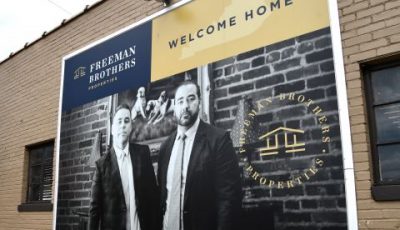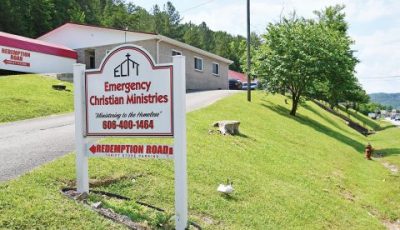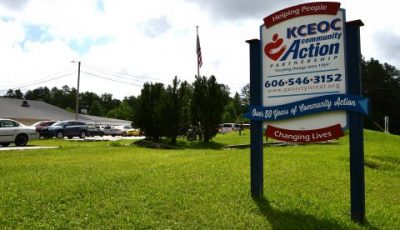Housing Insecurity: Local faith leaders talk challenges, resources and more

RRJ Solutions, located in downtown Corbin
Over the years, White Flag Ministry has served thousands of meals and helped hundreds of people in need find warmth and shelter on some of the coldest nights of the year. These efforts, spearheaded by First Baptist Church of Corbin, have been well-documented by this publication and others, but as time has progressed the issues that have led people to seek out the services of this ministry have not changed. If anything, the problem has grown, making it necessary for ministry leaders to begin thinking more about people’s long-term needs, as opposed to just providing temporary assistance.
“It is about coming alongside the people that we are serving and staying with them,” said FBC Corbin Pastor Alex Lockridge. “That is the hardest part of this ministry to convey to the general community, because this is a successful community filled with people who are doing well. They were also raised with folks who cared for them, though, and set them on a good path. We are dealing with folks who have nobody trying to put them on a good path, and it takes a lot more than just a meal and a motel room to fix that. It takes a community of people standing with them.”
Lockridge said that a lack of community support is typically one of the root causes of people experiencing housing insecurity.
“A lot of people want to place blame, and sometimes the blame lies solely on the person that we’re dealing with, but a lot of times they just came from such a terrible home life that it’s like they were destined for nothing but homelessness,” Lockridge said. “They just never had a shot. Nobody ever helped them or gave them a leg up. That is why case management with RRJ Solutions, or some other form of counseling, is what a lot of folks need.”
What is RRJ Solutions, you ask?
According to the “About Us” section of their website, they are “a comprehensive counseling agency offering mental health counseling, substance use counseling, and targeted case management for adults and at-risk youth.”
By offering these vital services, RRJ Solutions has helped White Flag evolve into a ministry that can truly help people thrive, instead of just survive.
Lockridge reported that 55% of the people who came to White Flag asking for help last season signed up for case management services, and were making progress over the course of the season. The ministry can guarantee those in need up to five nights of food and shelter, but in order to get the maximum benefit of 15 nights full compliance with RRJ Solutions is required.
“Compliance, for us, is our partnership with RRJ Solutions,” Lockridge explained. “They jumped on board two years ago, and before that we were just throwing band-aids onto some really bad problems. Their specialties are drug addiction and mental health, and that is a large number of the people that we see. It is one of those two, or both, so we ask that they come in and do an initial screening where specific needs can be assessed. They will then tell you the kind of steps that you need to follow in order to eventually get to the success that you want in life.”
Not surprisingly, Lockridge said those who have committed to this process in the past have typically had much better luck with finding ways out of their difficult situations. “Each time that people decide to stick with us and ride it out, those are the people that you will see eventually finding sustainability,” he said.
In addition to the issues related to lack of community support, Lockridge said that he thinks the overall lack of low-income, affordable housing options in the area is also a major contributing factor when it comes to the number of individuals who are facing housing insecurity.
“I think this is equal to landlords who aren’t doing what they should do,” Lockridge said. “Granted, there are always potential issues with the people that we’re dealing with, but they are also being thrown out without 30 days’ notice, or they are being thrown out because of some type of prejudice, or they are being thrown out because the landlord just doesn’t want to deal with it.”
“No one is following the due process,” Lockridge continued. “And there is no legal entity that is going to deal with that. Lawyers aren’t going to take their time with it. It’s a lot of time, a whole lot of work, and potentially not worth anything.”
“As a pastor, I see a world that God created for the purpose of people existing and thriving together,” Lockridge said. “I don’t think that we were ever created to just do this on our own and hope that it all works out. I think that, all throughout scripture, you see that people are better when they are together, utilizing the gifts, talents and resources that they have.”
“I think that everyone is constantly looking for community. I think that is built into our DNA, and I will always say that church community is the best way to do it, but if people don’t find that here, they will find it somewhere else. If they don’t, then it’s going to fail, fall apart, and when that happens you’ve lost your support base. That is when we start running into the folks that we are running into, who, instead of finding community, are chasing temporary highs to block out the fact that they don’t have that family and support.”
Another local pastor, Gordon McClure of Grace on the Hill Community Church in Corbin, pointed out that generational poverty is a very real issue in our region, but he also acknowledged that people everywhere are unfortunately becoming trapped in cycles of struggle and overall insecurity.
“I have seen homelessness in every community that I have lived in,” said McClure, who came to this area last year from Kansas. “I think that the problem is evolving everywhere. A lot of it is tied to the socio-economic climate of the country, but I think that different communities are also seeing that they need to be more proactive about sharing resources with the people who are going through those struggles.”
Specifically, McClure said that mental health issues and drug and alcohol abuse will often play large roles in leading people into housing insecurity. Like Lockridge, he said that we need to focus on these problems first, but he also agrees that more affordable housing options should be available for people in the community.
Grace on the Hill does not currently have a ministry that focuses specifically on housing insecurity, but they do operate ministries dedicated to addressing food insecurity and clothing needs, which go hand-in-hand with issues related to lack of housing.
“It is not one specific thing, but several things that are working against a person in order to bring them to the place where they are having these struggles,” McClure said. “With our ministries, we want to not only meet those pragmatic needs, but also the spiritual needs. It doesn’t solve every issue, but when it comes to things like drug and alcohol abuse, we in the Christian community believe in the deliverance from that, and that can make a big difference.”
If you or someone you know is experiencing housing insecurity, connect with these churches or your nearest place of worship to see what resources might be available to you there. For information on other organizations that are helping to combat this issue in our local area, see the future installments in this series throughout the summer.








